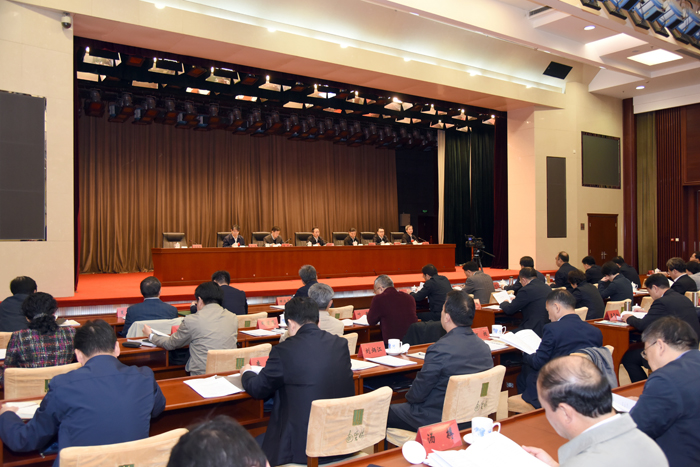
MEE held the 2018 symposium on the reforms in the national ecological and environmental departments between Oct. 26 and 27. Secretary of the Leading Party Members’ Group and Minister Li Ganjie presented at the symposium and delivered remarks.
Minister Li stressed that it is important to unswervingly implement the Xi Jinping Thought on ecological civilization and the guiding principles of the National Conference on Ecological and Environmental Protection, put up the uphill fight against pollution, center on the ecological and environmental improvements, and make greater strides in the reforms in the ecological and environmental sector.
Major progress has been made in protecting the blue sky, clean water and soil from pollution, and in the ecological conservation and restoration and environmental compliance inspection since 2018, which has led to improving environment so far, said Li. However, with more complicated environmental and economic scenarios, we still face multiple challenges, ranging from economic uncertainties, sluggish economic restructuring, more divergence between regions and water basins, and disadvantageous meteorological conditions. Therefore, we must remain true to our original aspirations and take the right measures towards continuous environmental improvements.
Moreover, the national ecological and environmental departments have moved forward with such reforms as the institutional restructuring, the reforms on ecological and environmental compliance inspection, the reforms on establishing a vertical management framework for the environmental monitoring, supervision, and enforcement areas of the environmental departments below the provincial level, the comprehensive reforms, and the reforms on streamlining administration, delegating powers, and improving services. Some of the reforms have witnessed breakthroughs. However, tough challenges remain.
To deepen reforms on streamlining administration, delegating powers and improving services is one of the decisions of the CPC Central Committee and the State Council, on which General Secretary Xi has made important oral and written instructions on multiple occasions, and Premier Li Keqiang has made deployments at the Cabinet’s video conferences for the past four years. The ecological and environmental departments across the country must take all factors into consideration and making steady progress in deepening those reforms, so as to invigorate the development, stimulate the space for efficient investment, create an environment for fair and equitable business operation, stabilize the market expectations, and balance the environmental, economic, and social benefits.
Since the start of this year, the MEE has organized a video conference and introduced a guideline to specify the major tasks and measures for deepening the above said reforms and transforming the government functions, said Li. In the immediate future, the objectives are to advance the modernization of the ecological and environmental governance systems and capacities and push forward the higher quality growth. To this end, we will transform the government functions, continue to reduce and remove the items that need administrative approval, and delegate the approval powers, significantly improve the approval efficacy, and lower the tax rates and fees. Also, we will make a change of work methodology, introduce creative regulatory instruments, step up regulation, and take more solid measures to strengthen the interim regulation and post regulation. We will make a change of work styles, better the government services, introduce creative public services in the ecological and environmental sector, advance the growth of green industries, and promote the “internet+ government services”.
In this process, a “one-for-all” approach is strictly prohibited, stressed Li, we should protect the rights and interests of the compliant enterprises. Otherwise, as in some cases of local areas, the images of our Party and government as well as those rights and interests are undermined, there are inconveniences for the people’s work and life, the original aspirations and missions of the ecological and environmental protection are contradicted, and there are disturbances to our protection efforts.
In response, the Ministry is about to take three steps to stop the “one-for-all” practice, first, we will introduce a more specific document, list the work requirements for each and every possible area and measure that may lead to “one-for-all”, and put in place long-term mechanisms for checking the nonfeasance and misfeasance, and for information sharing, public complaints, quantifiable accountability, and regulating the discretionary power. Second, we will launch two rounds of inspection on the “one-for-all” problems. Third, we will investigate and circulate typical cases and warn the local areas off such practice.
The national ecological and environmental departments should highlight the prohibition of “one-for-all” approach during the reforms on streamlining administration, delegating powers, and improving the services, demanded Li. We will introduce regulatory measures compatible with the performance evaluation targets and environmental management requirements, for key areas, regions, periods, and tasks. We will absolutely not order the halt of business operations in the excuse of green regulation, during the compliance inspection. We will not ask the compliant enterprises to halt operations and make rectifications. Specific measures will be taken in key industries and regions such as construction projects, service sector, animal and livestock breeding farms, characteristic industries, and industrial parks. For the problems revealed, we will make feasible solutions and set problem-and period-specific targets.